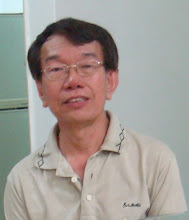During my trip to China, we often had to go the washrooms or toilets to ease ourselves. Usually, the washrooms in restaurants are all right but at Sinopec (equivalent to Malaysia's Petronas) petrol stations, the washrooms have no doors. Hence women tourists have to take turns to stand on guard while their friends are answering nature's call. There are occasions when umbrellas will have to be used when there are no toilets around at certain remote places in China. These will form a barricade or shield for the one who needs to pee.
In one of the washrooms I went to, I saw the following poster pinned on the wall.
It reads 'Lai ye cong cong, qu ye chong chong." The word for word translation is 'Come also in a hurry, go also flushing.' However, I will translate the line as 'you come rushing, then you go flushing' for the pun of it but the Chinese translated it as 'Have to hurry, was also chong chong to.' It is horrible English. For one thing, it is grammatically wrong to say 'have to hurry' - a sentence without a subject. 'was also chong chong to' carries no meaning at all because English people will not understand what 'chong chong' means. Worse still it is written in the past tense 'was' and cannot go with 'have to hurry' which has a finite verb 'have' already assuming that the subject is understood to be 'You'. The last word 'to' must be a mistake for 'too'.
To improve on the above, it can be rendered as 'You have to hurry no doubt, but you need to flush too before you leave.'
PARAGIS
-
NO WONDER this grass went viral all over the social media. With its endless
health benefits, it is truly God’s gift to mankind. We can find this weed
almo...
4 years ago








No comments:
Post a Comment